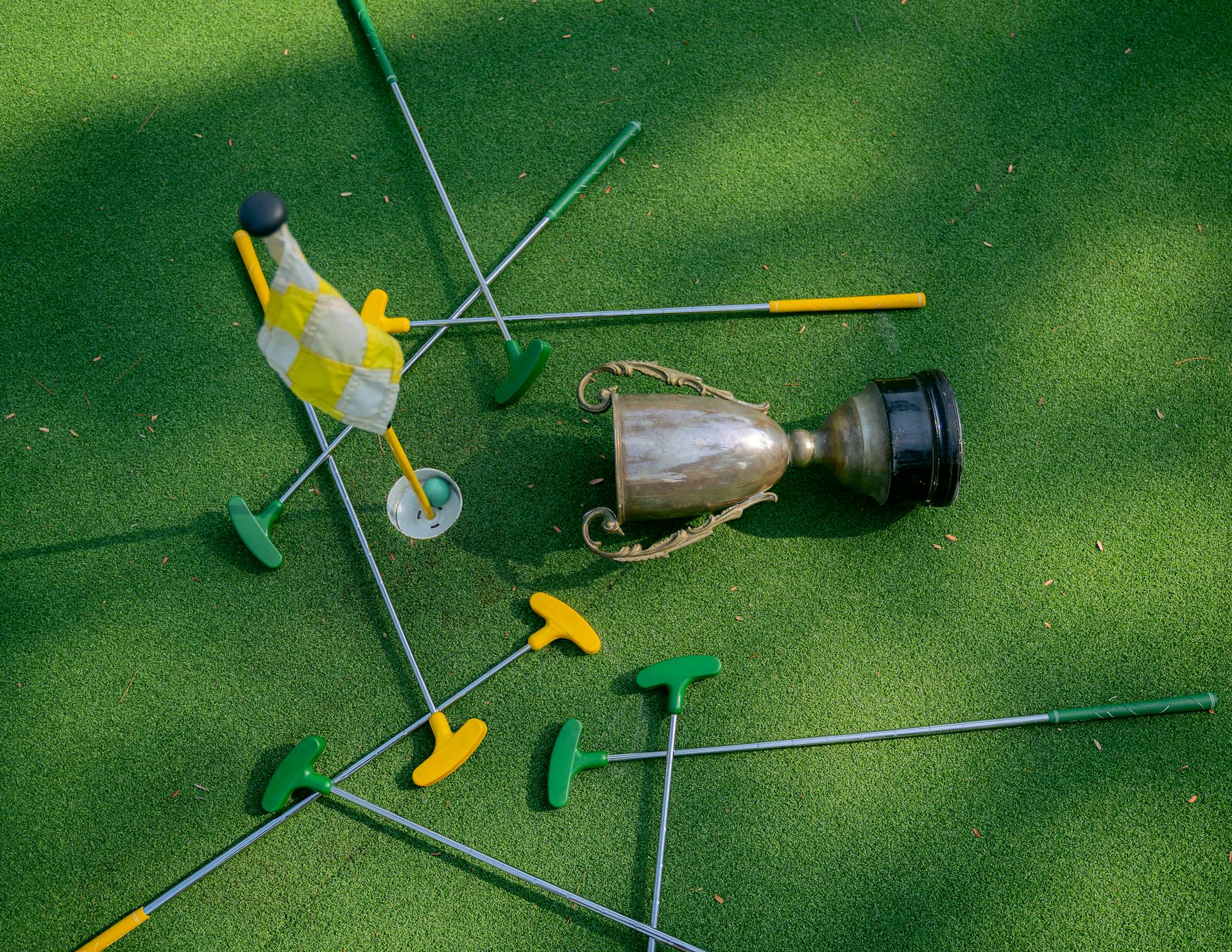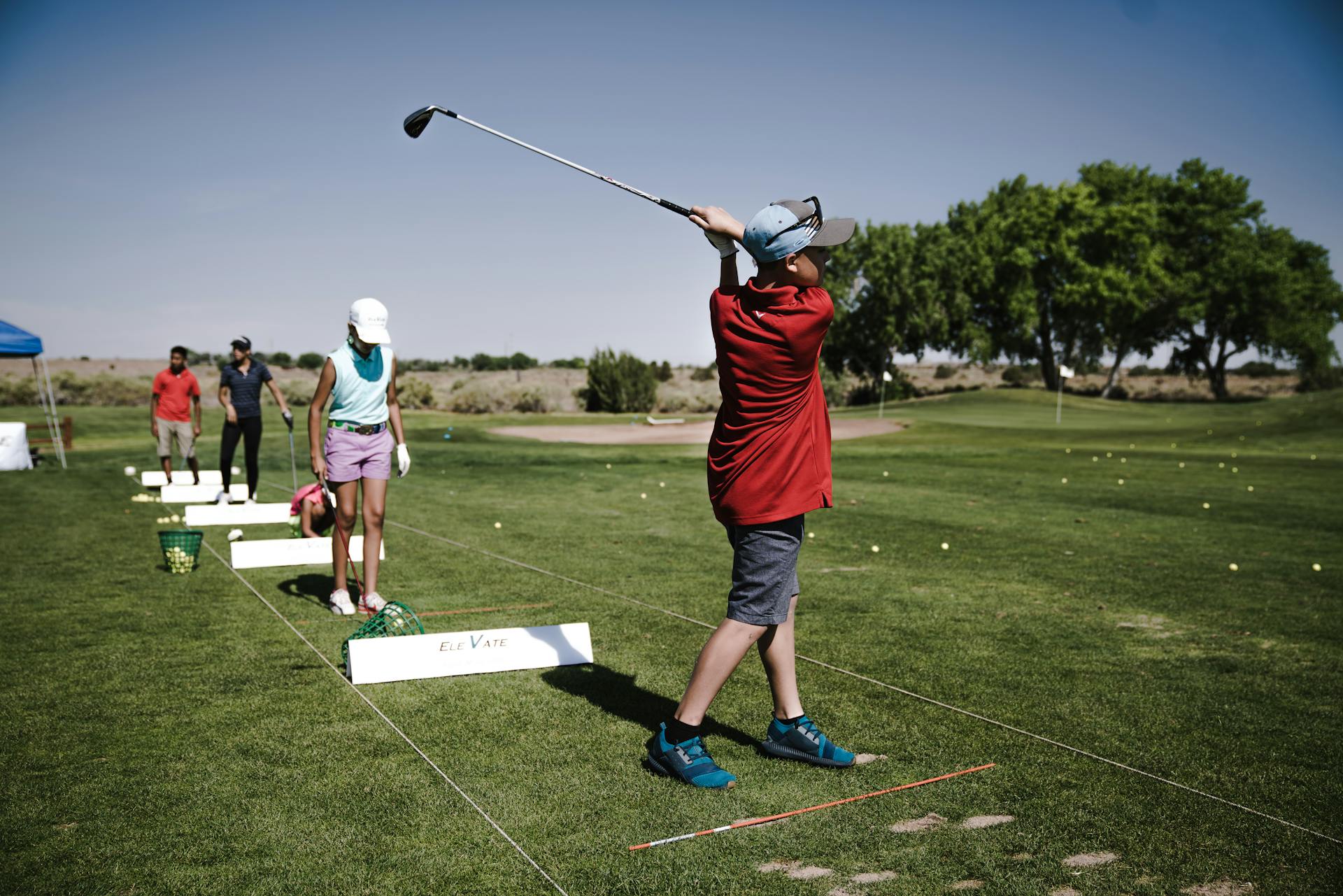
Learning to play golf is a challenge, and although it might not be terribly difficult if you’re just a casual player, it still takes practice - and potentially a few lessons - to become really good. That’s why the question of how many lessons one should take is so important.
The answer to this question is highly situational. Generally, people who are just looking to better their skillset with no aspirations of playing competitively can get away with just a few lessons. A single lesson with a PGA professional can provide instruction on basics such as grip, stance, follow-through and other fundamentals that contribute to effective ball striking. After grasping these basics and taking the time for self-practice in between lessons, the person should eventually see results (if they’re ready to put in the work).
For those who are aspiring competitive golfers or know that they have the desire and commitment to take their game up several notches, more long-term guidance from an instructor may be necessary. It could take eight to twelve lessons for amateur players who wish to improve quickly; depending on the strategies employed by your instructor, this usually means mastering complex fundamentals such as fairway bunker play or chipping before moving onto other topics such as advanced shot making technique and advanced course management strategies.
When deciding how many golf lessons one should take, whether you’re a novice or an experienced golfer, try meeting with instructors in your local area and seeing what type of plans they can offer up - as well as seeing how comfortable you feel with each instructor. After researching your options, decide on an option based on what fits best with your goals; after all its your game – so do right by it!
Explore further: Tennis Lessons Cost
How often should I practice golf?
Practicing golf is one of the most important components of improving as a player. To maximize your progress and take your game to the next level, there's no one-size-fits-all answer to the question, “How often should I practice golf?" The frequency of practice required will depend on several factors including your current skill level, available time and resources, and desired goals.
If you're just starting to play golf or you're an experienced golfer looking to maintain your skills, just a few hours per week is all you need to make a noticeable improvement. Beginners can start by setting aside an hour per week for practice. As basic techniques and fundamentals start to become ingrained in your muscle memory, increase the frequency of practice while decreasing the amount of time spent on each session.
If you're an intermediate or advanced golfer aiming for serious improvement, you should dedicate more time each week for regular practice sessions. Aim for at least 3 hours per week divided between grinding on the range and technique work like short game drills and putting practice. This type of intensive training builds a solid foundation that will support those big changes such as improving power output or learning greenside bunker shots.
The frequency at which an individual should practice golf ultimately comes down to personal preferences: what goals they want to achieve, their skill level, their available resources and how much they enjoy practicing! With some dedication and commitment set aside some time each week for golf - no matter what level of golfer you are - and you’ll be sure to see progress quickly in terms of accuracy, strength and consistency!
Consider reading: Baseball Game
What is the most important skill to focus on in golf?
When it comes to learning and improving one's skills in the game of golf, it is important to focus on the basics first. Among these basics, the most important skill to focus on is undoubtedly that of accuracy. Being accurate means having the ability to consistently hit the ball in the same area with each shot - and this doesn’t just apply to the drive. It must be applied to every shot throughout a round of golf.
Having the accuracy to hit fairways, greens and land in specific yardages off approaches can only really be achieved through practice, dedication and a determination to master this fundamental skill. The ability to shape shots, control spin and make them true will greatly depend on how well one can swing accurately and with control. Perfecting an accurate swing is absolutely essential for every golfer who strives for excellence.
Besides focusing simply on accuracy alone, there are other skills that should not be overlooked when aiming for consistent success. Practices such as concentration and course management are key elements when playing a good round of golf as they will influence decisions made during a round as well as choices one may make before even driving off on their first tee shot. It is important for every golfer to understand how different courses may require different routes through 18 holes in order to maximize scores or win tournaments - all these features depend on great course management skills.
If there is only one skill you choose to focus on when playing golf, it should undoubtedly be accuracy; however, by broadening your skill set through practice sessions including concentration drills, course management techniques and swing-shape exercises, you will definitely build your foundation for longterm success in golf!
Here's an interesting read: Tennis Practice
What type of golf lesson would best suit my current skill level?
If you are looking for some golf lessons to take so that you can progress your game, then your current level of skill will play a major role in finding the right type for you. If you consider yourself a complete beginner and have never even held a golf club before, then a starter lesson would be perfect for you. It should give you an overview of the basic fundamentals of the game such as swing technique, body alignment and ball positioning, so that you’ll have all the fundamentals down when it comes to learning more advanced skills.
If your skill level is slightly beyond a beginner but you still don’t feel ready to take on an experienced golfer, then considering taking an intermediate class. This should help develop the basics that you learned in your beginner courses and introduce some more advanced concepts like bunker play and etiquette. Club selection should also be touched upon to help develop your game further.
For those who are already quite advanced and confident in their abilities, either a one-on-one lesson or small group session with friends would likely be best. By focusing solely on yourself or with a select few people who share the same goals as yourself, your instructor will aim to help you refine particular skills or work on any problem areas where subtle adjustments may be needed in order to lower your score.
No matter what level player you may be, golf is a sport that can always be improved upon through practice and perfecting technique. Taking qualified lessons designed for players at various levels of skill can enhance your knowledge of the game and ultimately help lower your scores through playing better golf.
Suggestion: Makes Advanced Ev Golf Carts
What should I expect to learn in a golf lesson?
When starting out in golf, it can be intimidating not knowing what to expect from a lesson. Before you spend time and money signing up for golf lessons it’s important to understand ahead of time what you should expect.
Golf lessons can vary greatly depending on the instructor and level of expertise but there are some key fundamentals that remain consistent. Professional golfers learn and practice the same fundamentals over and over again, so it is important to start establishing them from the initial lesson.
During your first lesson, the instructor will observe your current skills and form before helping you improve them. They may start by discussing your experience with the game and any goals you may have before providing a custom analysis of your game. Common components that are covered in a golf lesson include stance, grip, swing path and contact with the ball. It is also expected that an instructor will explain golf etiquette such as proper behavior when on the course or how to mark a scorecard correctly.
If this is what you want to learn during a lesson then ensure you pick an instructor that knows how to teach properly. A great teacher will be patient, observant, encouraging and motivating as each student learns differently and at their own pace. With their help and guidance, you should come away feeling confident in your improved technique after each lesson!
For more insights, see: What to Wear When Running in Rain?
What type of practice drills can I do to improve my golf skills?
Golf is an enjoyable sport and a great way to stay active and remain social, but without the right practice drills, it can quickly become frustrating. No matter your current skill level, any golf enthusiast should be taking advantage of these helpful practice drills to improve their game.
The putting drill is the simplest yet most effective way to improve one’s skills on the course. To begin, set up two feet long pieces of string or twine in a straight line at five feet from the cup. Place five balls evenly spaced from each other on this line, aiming each ball towards the cup. Take turns putting each ball towards the cup and aiming for accuricy rather than power; count how many made it in and keep track of your scores over time.
The chipping drill is perfect for novice golfers looking to learn more about mid-range shots from short distances around the green. Roll out an overlapping rug that’s 12 yards wide for added emphasis on accuracy rather than power. Set up four golf balls ten yards away from the edge of this rug and start by chipping shots that land neatly inside the rug’s area limit. Once you build confidence with this distance, you may move farther back and work your way up towards longer shot distances as well.
Lastly, utilize flying range practice drills - also known as ‘full swing’ drills - with two clubs of varying lengths to practice proper timing and technique during regular swings. Take seven full swings per club while alternating between them; focus on each pitch shot while counting down from 7 strokes in order to ensure consistency each time you swing your club. With consistent practice using these simple yet effective practice drills, any golfer can start improving their game in no time at all!
Suggestion: Volleyball Club
How long should it take me to improve my golf game?
Improving your golf game isn't something that happens overnight. Depending on your aptitude and ambition, it could take many months to years to become a master. While any amount of practice will naturally result in improvement, the most important factor to consider is how you approach the process.
For beginners, just learning the fundamentals like elbow placement, stance and grip will help you hit straighter shots while having functions like putting and chipping down is an equally important factor in your success. Aim to block out time every week devoted solely to honing your skills in these areas. Getting out on the course every few weeks or so can also help reinforce what you are learning on a regular basis. It's one thing to understand the instructions theoretically but something else entirely when you apply them for yourself on the course.
There's no universal formula detailing how long it takes for someone to improve their golf game as people have different skill sets and fitness levels. Nevertheless, try not to get too impatient with yourself and refine each part of your game at a time but also ensure you have fun too! With enough willpower and dedication, you should start trending positively within 6 months but don't forget that perfection takes time — see it as a challenge that has no set deadline but one worth pursuing none the less!
If this caught your attention, see: How to Become a Golf Course Architect?
Sources
- https://www.golfeaser.com/golf-lessons.html
- https://golfwaterton.com/how-much-practice-golf/
- https://golfingfocus.com/how-many-golf-lessons-do-you-need/
- https://golfmonster.com/driving-range-drills/
- https://golfpracticeguides.com/golf-practice-101/
- https://golf.com/instruction/golf-basics-every-beginner-golfer-should-know/
- https://practical-golf.com/golf-tips/
- https://nickfoygolf.com/golf-practice-frequency/
- https://golfworkoutprogram.com/how-often-should-you-practice-golf/
- https://golfworkoutprogram.com/how-many-golf-lessons-should-i-take/
- https://skillest.com/blog/how-many-golf-lessons-should-i-take/
- https://www.golfspan.com/best-online-golf-lessons
Featured Images: pexels.com


